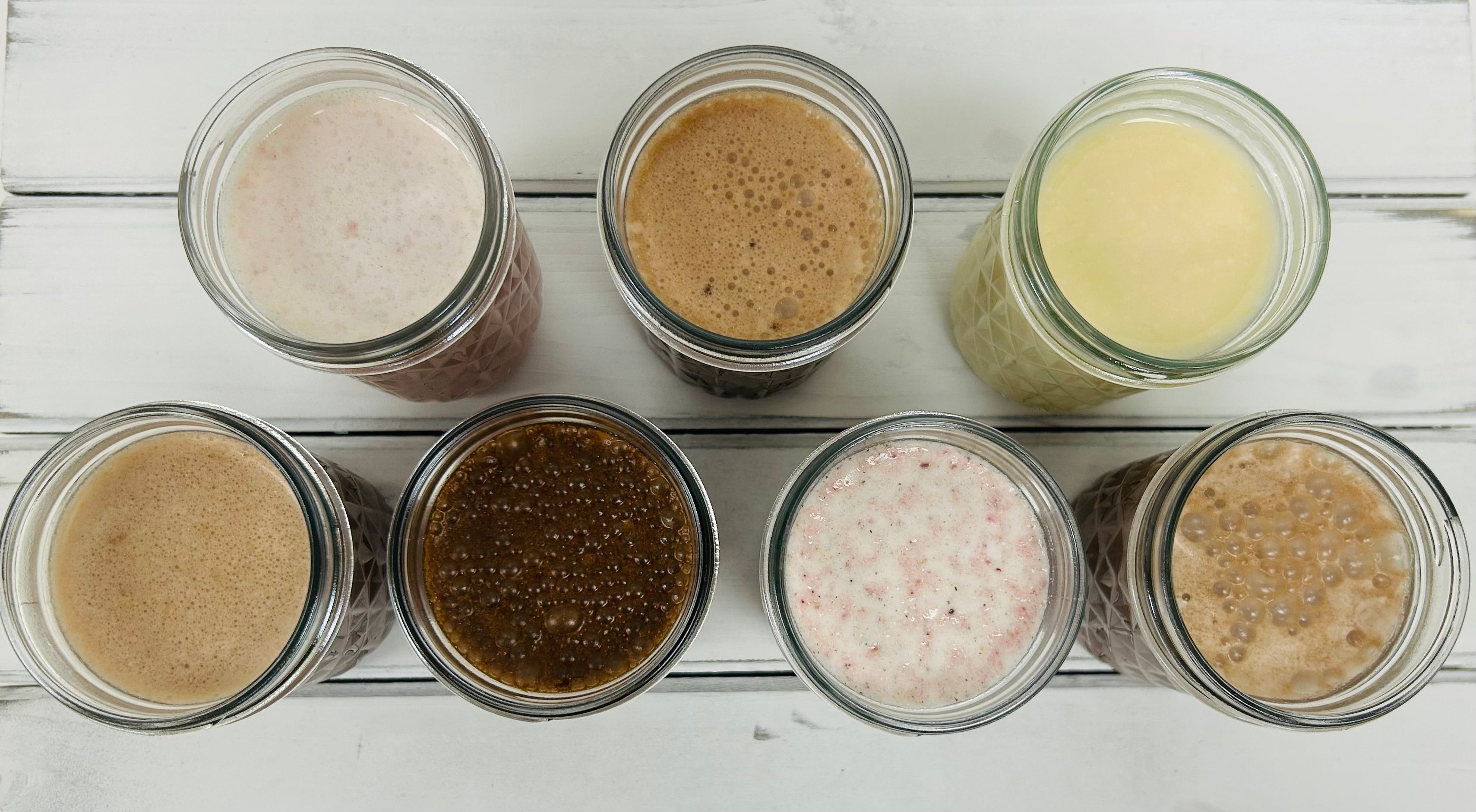Your cart is empty

Foods to Eat and Foods to Avoid While Taking Ozempic for Weight Loss
What To Eat When Taking Ozempic
If you've been prescribed Ozempic for managing your type 2 diabetes, you might be wondering what foods you should eat to get the best results. Ozempic (semaglutide) is a medication that helps control blood sugar levels, but it works best when combined with a proper Ozempic diet plan . In this article, we'll go over some nutritional guidelines and tips to help you make the most of your Ozempic treatment.
Shop GLP-1 Diet Collections: GLP-1 Protein Bars | All GLP-1 Weight Loss Foods
The Basics of Eating Well with Ozempic
When taking Ozempic, eat meals that have lots of different healthy foods. Pick foods with plenty of vitamins, minerals, and fiber. And don't eat too much at one time.
Here are some tips:
- Eat a lot of veggies like broccoli, spinach, and peppers
- Choose proteins like chicken, fish, tofu, and beans
- Eat whole grains like brown rice and sweet potatoes
- Include good fats from avocados, nuts, seeds, and olive oil
- Have low-fat dairy or soy milk for calcium and vitamin D
Best Foods to Eat While on Ozempic
Build your meals around these healthy choices:
Proteins: Protein helps your body in many ways. When taking a semaglutide medication like Ozempic, lean muscle tissue is at risk along with the weight loss. Protein helps you keep that lean muscle throughout your body. Good options are grilled chicken, turkey, fish, eggs, tofu, and beans. Protein shakes are also a great option while taking Ozempic. They fill you up too.
Vegetables: Veggies have few calories but lots of fiber and nutrients. Enjoy colorful ones like leafy greens, carrots, tomatoes, and zucchini. Try to fill half your plate with veggies.
Whole Grains: Unlike simple carbs (think white bread and sugary snacks), complex carbohydrates provide long-lasting energy and fiber. Pick whole grain bread, pasta, cereal, and starchy vegetables like sweet potatoes to maintain gut health while taking Ozempic.
Healthy Fats: Don't fear fat! Healthy fats are an important part of a balanced diet. They help with vitamin absorption and keep you feeling full. Good fats are in avocados, nuts, seeds, olive oil, and fish like salmon.
Dairy: Dairy products are a great source of calcium and vitamin D, which are important for bone health. Milk, yogurt and cheese give you calcium and vitamin D. Choose low-fat or non-dairy options like almond milk. Dairy also helps add protein into your diet.
Broad List of Foods to Eat While Taking Ozempic:
Here's a list of some of the basic foods that should be a staple in your new diet, as long as your specific dietary restrictions allow them:
| Category | Foods to Eat |
|---|---|
| Lean Proteins |
|
| Legumes and Beans |
|
| Dairy and Dairy Alternatives |
|
| Vegetables |
|
| Healthy Snacks and Beverages |
|
Ozempic Foods to Avoid
When taking Ozempic, it's important to avoid certain foods that can interfere with your weight loss goals, digestive system, and overall health. Here's our suggesstions for foods that should be avoided while taking Ozempic:
Greasy Foods: While healthy fats are important, foods that are high in saturated and trans fats can contribute to weight gain and heart disease. Limit fried foods, fatty meats, chips and cookies. Too much unhealthy fat is bad for your heart.
Sugary Foods: Sweet foods like candy, soda and white bread can make your blood sugar spike up fast. They don't have many nutrients either.
Alcohol and Caffeine: Both can change your blood sugar and may not work well with Ozempic. Ask your doctor how much is okay.
Sugary Drinks: Avoid soda, sweet tea, and fruit juice. They have lots of sugar and calories. Drink water or sugar-free drinks instead.
Below is a more detailed list of the foods to avoid while on Ozempic:
| Category | Foods to Avoid |
|---|---|
| High-Sugar Foods |
|
| High-Fat Foods |
|
| Highly Processed Foods |
|
| High-Carbohydrate Foods |
|
| Foods High in Salt |
|

Eating Habits to Support Weight Loss with Ozempic
Eat Slowly and Mindfully
Eating slowly and mindfully is so important while taking Ozempic. This medication slows down gastric emptying, which means food stays in your stomach for longer. Eating quickly can lead to discomfort, nausea, and vomiting. To avoid these side effects, take your time while eating, savor each bite, and chew your food thoroughly. This will help your body digest food more efficiently and reduce the risk of discomfort.
Stay Hydrated
Staying hydrated is also essential while taking Ozempic. Dehydration can exacerbate side effects like nausea, vomiting, and diarrhea. Drink plenty of water throughout the day to help with digestion and prevent dehydration. Aim for at least 8-10 glasses of water per day, and consider adding electrolyte-rich beverages like coconut water or sports drinks to help replenish lost electrolytes.
Avoid Large Meals
Large meals can be challenging to digest while on Ozempic. Eating smaller, more frequent meals can help reduce discomfort and nausea. Divide your daily calorie intake into 4-6 meals, and choose foods that are easy to digest. Avoid heavy, greasy, or spicy foods that can irritate your stomach.
Prioritize Fiber
Fiber is essential for digestive health and satiety. Include high-fiber foods like fruits, vegetables, whole grains, and legumes in your diet. Fiber helps regulate bowel movements, prevents constipation, and supports the growth of beneficial gut bacteria. Aim for 25-30 grams of fiber per day, and increase your intake gradually to avoid discomfort. Check out AmBari's selection of high-fiber foods designed specifically for weight loss.
Additional Tips
- Eat bland foods: Opt for bland, low-fat foods like crackers, toast, and rice if you experience nausea or vomiting.
- Avoid high-fat foods: Limit or avoid high-fat foods like fried foods, greasy meats, and full-fat dairy products, which can exacerbate side effects.
- Choose healthy fats: Include healthy fats like avocado, nuts, and olive oil in your diet to support overall health and satiety.
- Stay active: Regular physical activity can help improve digestion, reduce side effects, and support weight loss.
- Monitor your body: Pay attention to your body's hunger and fullness cues, and adjust your eating habits accordingly.
Tips for Meal Planning on Ozempic
A little planning helps with your new healthy diet:
- Prep food ahead of time when you can, like cut up veggies
- Keep healthy foods in your kitchen, like frozen veggies and beans
- Read food labels to find foods high in fiber and protein but low in sugar and bad fats
- Use smaller plates to help you eat less
- Make half your plate veggies, 1⁄4 protein, and 1⁄4 whole grains
Sample Meal Plan for an Ozempic Diet
To give you an idea of what a day of healthy eating might look like while taking semaglutide, here's a sample meal plan:
| Meal | Sample Options |
|---|---|
| Breakfast | Oatmeal with berries and chopped nuts, Veggie omelet with whole grain toast |
| Lunch | Grilled chicken salad with mixed greens and vinaigrette, Lentil soup with a side salad |
| Dinner | Baked salmon with quinoa and roasted broccoli, Tofu stir-fry with brown rice and mixed veggies |
| Snacks | Greek yogurt with sliced fruit, Carrot sticks and cucumber slices with hummus |
Remember, this is just an example - your individual needs may vary.
Related: The Best Wegovy Meal Plan
Working with Your Healthcare Team
It's so important to stay in close communication with your doctor and registered dietitian while taking Ozempic. They can help you adjust your diet based on your individual needs and response to the medication. Remember, your taste preferences might change while taking ozempic, so you may need to try new foods to adjust your diet.
Your doctor will also likely monitor your blood sugar levels and weight regularly to ensure the medication is working effectively.
"The food you eat can be either the safest and most powerful form of medicine or the slowest form of poison." - Ann Wigmore
With a little planning and preparation, you can take control of your diet and set yourself up for success with Ozempic. Here's to good health and happy eating!
Writer: Carrie H. Carrie is a dedicated health and nutrition writer with a strong background in medical and scientific research. She is driven by a passion for helping others lead healthier lives, diving into the latest scientific research. Combining evidence-based knowledge with practical advice, Carrie strives to provide accurate and valuable information on health, nutrition, and wellness. Her ultimate aim is to empower readers, enabling them to make informed choices about their well-being. |
Reviewed By: Dr. Kevin Huffman Dr. Kevin D. Huffman, D.O., is a leading board-certified bariatric physician with extensive expertise in treating obesity. He has trained countless healthcare providers and founded American Bariatric Consultants to develop protocols and training materials sought by medical societies, pharmaceutical companies, patients, and hospitals. Dr. Huffman's impact extends beyond patient care as he prepares physicians for board certification, expanding access to this vital treatment. |
- Choosing a selection results in a full page refresh.















